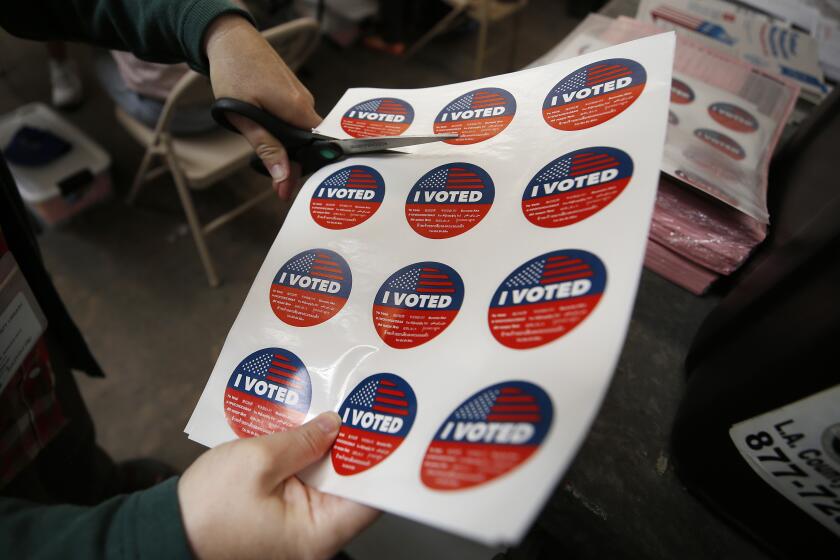The Times’ recommendations for Los Angeles County Superior Court judges

- Share via
California uses a hybrid system to select its trial judges, including the nearly 500 who serve on the Los Angeles County Superior Court. They’re considered elected officials, yet the vast majority — 9 out of 10 — are appointed by the governor and never go before the voters.
Every even-numbered year, though, a handful of seats that were vacated and not filled by appointment will go on the ballot, along with sitting judges who have been challenged for reelection. This year, L.A. County voters have nine judicial seats to fill.
Here are the L.A. Times’ editorial board endorsements for elected offices in Los Angeles city and county, LAUSD, superior court, statewide offices, the state legislature and U.S. House and Senate seats.
For many years, the most successful judicial candidates were prosecutors, presumably because voters believed that they would make tougher judges who would deal more harshly with criminal defendants. This year there are several deputy public defenders running, an interesting development that’s part of the broader movement for criminal justice reform.
Superior Court judges, of course, preside over more than just criminal cases. They could be assigned to courtrooms in which they’ll have power to dissolve marriages, break up families, appoint conservators, approve or reject evictions, and undertake a wide variety of other duties.
The Times seeks the candidates best suited to the bench based on their legal knowledge and experience; their respect for litigants, lawyers and jurors; their ethics and their courtroom demeanor. These recommendations are made after interviewing the candidates, studying their records and speaking with lawyers and others who have worked with or against them.
Candidates who receive more than 50% of votes cast in each race are elected in June and will begin their six-year terms in January, unless appointed earlier by the governor to fill the vacancy. Races in which no candidate receives a majority will proceed to November runoffs.
The Times recommends:
Office 3: Sherilyn Peace Garnett
Sherilyn Peace Garnett is a well-regarded judge who was challenged by two lawyers in their belief that Congress would confirm her appointment to the federal district court by election day, leaving the office vacant. They turned out to be correct — she was confirmed on April 27 — although the formalities are not yet complete. She’s by far the best of the three candidates in her race, although voters should be aware that even if she wins, she will have moved on to her federal court position. Neither of the two challengers — bankruptcy lawyer Frank Amador and business lawyer Timothy Reuben — are standouts. If Garnett receives more than 50% of the vote June 7, the office will be vacant and the governor would be able to appoint a new judge. If she receives less than 50% but comes in first or second, there would be a November runoff between Amador and Reuben.
Office 60: Abby Baron
One of nearly a dozen prosecutors running for judge this year, Abby Baron stands out for the praise she has received not just from police and crime victims’ advocates but also from defense attorneys, who cite her fairness and desire for a just result rather than a conviction at all costs. Sharon Ransom, Baron’s colleague in the district attorney’s office, is also impressive, but voters get to pick only one. Baron is the best choice in a field that also includes Deputy Public Defender Anna Slotky Reitano, DUI defense specialists Craig Sturm and Mark Rosenfeld, and Administrative Law Judge Troy Slaten.
California’s 2022 primary election is Tuesday. Here’s how to cast a ballot.
Office 67: Fernanda Maria Barreto
Fernanda Maria Barreto is another prosecutor — and another standout candidate. She’s running against yet another prosecutor, Ryan Dibble, and a deputy public defender, Elizabeth Lashley-Haynes. Because voters fill only a very narrow portion of the bench, they have no hope of changing the court’s composition and would be wise to simply pick the best candidate in each race, and in this case that’s Barreto, who has earned respect for her sensitive handling of dozens of violent felony cases following a brief civil practice and several years of prosecuting domestic violence.
Office 70: Holly Hancock
Holly Hancock is an experienced deputy public defender who has handled a significant number of jury trials. She possesses the valuable combination of self-confidence and civility so essential in a judge who must control a courtroom with a firm but careful hand during high-stakes proceedings when emotions are running high. She is the best of five candidates, including one current and one former deputy district attorney, a Long Beach city prosecutor and a volunteer traffic and family law judge.
Office 90: Melissa Lyons
Currently in charge of juvenile prosecutions at the Superior Court’s Compton branch, Melissa Lyons has been a prosecutor for 16 years and is noteworthy for her trial experience in the sex crimes division and for the time and effort she devotes to community programs to help law students as well as young people living in areas with high gang activity. She has the edge over Deputy Public Defender Kevin Thomas McGurk, who also is a well-regarded trial lawyer. Also running are Deputy Dist. Atty. Leslie Gutierrez, who currently lacks the experience needed for the bench, and criminal defense lawyer Naser Khoury.
Office 116: David Gelfound
David Gelfound is a highly regarded Los Angeles Superior Court judge who is being challenged by Deputy Public Defender Lloyd Handler on spurious grounds. Handler’s actual beef is (or at least ought to be) with Judge Michael O’Gara, who was disciplined by the state’s judicial watchdog agency for his social media posts opposing Dist. Atty. George Gascón and making other statements that demonstrate bias and inappropriate participation in political activity. That’s got nothing to do with Gelfound, whose supervisory role over three courthouses involves things like monitoring workflow but not his colleagues’ Facebook activity. Handler wrongly criticizes Gelfound for failing to control O’Gara. Judges shouldn’t be ousted by voters for specious reasons. Otherwise, they may be concerned more about the popularity of their rulings and other decisions than following the law or the best interests of justice.
Office 118: Melissa Hammond
In this six-candidate race, Deputy Dist. Atty. Melissa Hammond is the best choice. She is the rare candidate whose career includes civil law, criminal defense and prosecution, giving her an unusual and valuable perspective on the legal system. Her opponents include fellow prosecutors Keith Koyano and Georgia Huerta, and Administrative Law Judge Klint McKay, all of whom have the necessary experience for the job. Also running are attorneys Carolyn “Jiyoung” Park and Shan Thever.
Office 151: Patrick Hare
Patrick Hare is an experienced and widely respected deputy public defender who handled more than 100 jury trials, as well as non-criminal matters such as conservatorships and juvenile dependency cases. He’s the best in this four-candidate field that includes prosecutors Karen Brako and Richard Quinones. Thomas Allison has a compelling personal story of overcoming poverty to establish a career with a wide-ranging law practice that includes family, civil and criminal law. The court could use that kind of perspective, but of the four candidates, Hare is the candidate who has the most trial experience and who is best prepared to serve on the bench.
Office 156: Carol Elswick
Judge Carol Elswick crossed the line in improperly ordering defendants in her courtroom into custody. That earned her a 2018 rebuke from the state Commission on Judicial Performance, and properly so. It has also resulted in a reelection challenge, one that voters might seriously consider except that her challenger, Albert Robles, has also run into problems in the past. Robles was found to be improperly holding two elected offices at the same time (mayor of Carson and member of the Water Replenishment District of Southern California board), and he fought, unsuccessfully, for the district to pay for his defense against the lawsuit to oust him from the Carson City Council. Elswick has acknowledged that she was wrong and has apologized. There have been no subsequent reports of misconduct on her part since 2016. Of the two candidates, Elswick’s experience makes her the better choice.
Read more endorsements at: latimes.com/endorsements.
More to Read
A cure for the common opinion
Get thought-provoking perspectives with our weekly newsletter.
You may occasionally receive promotional content from the Los Angeles Times.











